Comprehensive Guide on the Name “Blake”
Origin and Historical Background
The name Blake originally hails from Old English and its etymology can be traced to the Anglo-Saxon period. Derived from the Old English words “blac” meaning ‘black’ or ‘dark’ and “blæc” indicating ‘pale’ or ‘white’, the name carried divergent meanings. Historically, it was used to describe someone with dark hair or complexion, hence its modern interpretation as ‘Black Hair’. The name Blake was often adopted by families who wished to signify strength and resilience, characteristics associated with the dark or swarthy connotation.
Meaning and Cultural Significance
Blake carries a powerful cultural significance. While its primary meaning is ‘Black Hair’, it also evokes imagery of mystery, depth, and elegance. The rich connotations can extend to symbolize midnight, raven, coal, and swarthy – all elements associated with a profound allure. Its use as a neutral name appreciates the versatility and modern appeal, allowing it to transcend traditional gender norms and be embraced broadly.
Famous Historical Figures with the Name Blake
1. William Blake
- Historical Era: 18th Century
- Key Contributions: Renowned English poet, painter, and printmaker.
- Cultural Impact: Widely considered one of the seminal figures of the Romantic Age, William Blake’s works such as “Songs of Innocence and Experience” and “The Marriage of Heaven and Hell” have had a lasting impact on poetry, visual arts, and culture.
2. Robert Blake
- Historical Era: 17th Century
- Key Contributions: Esteemed English naval officer and general.
- Cultural Impact: Known as the “Father of the Royal Navy,” Robert Blake revolutionized naval tactics and was a pivotal figure in asserting British maritime supremacy during his time.
Usage Over Time
The name Blake has seen a steady increase in popularity, particularly in English-speaking countries. Historically used as a surname, it transitioned to a given name in the late 20th century. According to the Social Security Administration (SSA), Blake has consistently ranked among the top 100 names for boys and, more recently, has gained popularity as a neutral name, reflecting contemporary trends towards androgyny in naming conventions.
Pronunciation Guide
Blake is pronounced as /bleɪk/. Phonetically, it can be broken down into a single syllable, starting with a voiced “b” sound, transitioning to a long “a” (/eɪ/), and ending with a hard “k”.
Biblical Context
The name Blake does not have a direct reference in Biblical scriptures or context. However, its association with dark and light elements can be poetically tied to the Biblical metaphor of darkness and light, often used to symbolize the juxtaposition of good and evil, ignorance and enlightenment.
Additional Unique Information
Numerology
The name Blake resonates with the number 6, which is often associated with nurturing, responsibility, and caring – reinforcing the protective and strong traits.
Variations and Cultural Variants
While Blake remains consistent in its spelling across English-speaking countries, it can have different forms or be combined with other names, such as Blakely.
Popularity Trends
According to the SSA, Blake has been a staple in the lists of popular names over multiple decades. Particularly in the 2010s, it secured a spot in the top 100 names for boys and has increasingly become a favorite for girls as well.


